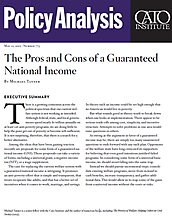There is a growing consensus across the political spectrum that our current welfare system is not working as intended. Although federal, state, and local governments spend nearly $1 trillion annually on at least 126 anti-poverty programs, we are doing little to help the poor get out of poverty or become self-sufficient. It is not surprising, therefore, that there is a search for a better alternative.
Among the ideas that have been gaining traction recently are proposals for some form of a guaranteed national income (GNI). Those proposals can take a variety of forms, including a universal grant, a negative income tax (NIT), or a wage supplement.
The case for replacing the current welfare system with a guaranteed national income is intriguing. It promises an anti-poverty effort that is simple and transparent, that treats recipients like adults, and that has a better set of incentives when it comes to work, marriage, and savings. In theory such an income could be set high enough that no American would live in poverty.
But what sounds good in theory tends to break down when one looks at implementation. There appear to be serious trade-offs among cost, simplicity, and incentive structure. Attempts to solve problems in one area would raise questions in others.
As strong as the argument in favor of a guaranteed income may be, there are simply too many unanswered questions to rush forward with any such plan. Opponents of the welfare state have long criticized its supporters for believing that even good intentions justified failed programs. In considering some form of a universal basic income, we should avoid falling into the same trap. Instead we should pursue incremental steps: consolidate existing welfare programs, move from in-kind to cash benefits, increase transparency, and gather additional data. This would allow us to reap some of the gains from a universal income without the costs or risks.

